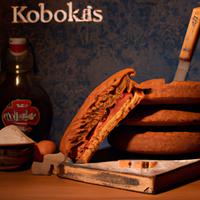
1 serving (20 grams) contains 100 calories, 1.0 grams of protein, 5.0 grams of fat, and 12.0 grams of carbohydrates.

Log this food in SnapCalorie

Nutrition Information
Calories |
1190.5 | ||
|---|---|---|---|
% Daily Value* |
|||
| Total Fat | 59.5 g | 76% | |
| Saturated Fat | 35.7 g | 178% | |
| Polyunsaturated Fat | 0 g | ||
| Cholesterol | 119.0 mg | 39% | |
| Sodium | 595.2 mg | 25% | |
| Total Carbohydrates | 142.9 g | 51% | |
| Dietary Fiber | 6.0 g | 21% | |
| Sugars | 71.4 g | ||
| protein | 11.9 g | 23% | |
| Vitamin D | 0 mcg | 0% | |
| Calcium | 119.0 mg | 9% | |
| Iron | 2.4 mg | 13% | |
| Potassium | 238.1 mg | 5% | |
* Percent Daily Values are based on a 2,000 calorie diet. Your daily values may be higher or lower depending on your calorie needs.
Food Attributes
Source of Calories
About Boterkoekje
Boterkoekje, or Dutch butter cake, is a rich and decadent treat originating from the Netherlands. This traditional dessert is made primarily from butter, sugar, flour, and eggs, giving it a dense and moist texture with a golden crust. Sometimes flavored with almond extract or topped with slivered almonds, boterkoekje is known for its irresistible buttery taste. While it embodies the indulgence of Dutch baking, the high fat and sugar content make it a calorie-dense dessert not ideal for everyday consumption. It is typically enjoyed in small portions alongside coffee or tea. Though not particularly nutritious, the simple ingredient composition contains no artificial additives, and its homemade preparation allows for slight adjustments to suit dietary preferences. This classic treat is a delightful example of European pastry tradition and is best savored in moderation.



